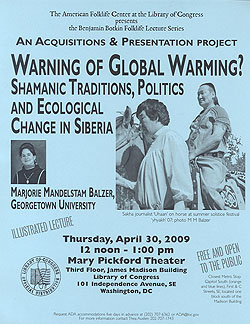| |
|||
|
|
The American Folklife Center at the Library of Congress April 30, 2009 Event Flyer Warning of Global Warming?
|
|
Siberian indigenous peoples' striving for self-determination and spiritual vitality has been an impressive trend in the past twenty years, but their efforts are threatened by political, social and ecological change.This talk, based on long-term fieldwork in the Sakha Republic (Yakutia) and beyond, probes the implications of indigenous peoples' concerns. The focus is mainly on the Sakha (Yakut), who are the farthest north of the Turkic language speakers, and the majority indigenous group of their multiethnic republic in the Far East of the Russian Federation. Since the Soviet Union collapsed, they have been coping with the tensions of increased development and with mixed signals from federal policy-makers, while making valiant attempts at cultural revitalization.
In summer 2007, a close Sakha colleague, Uliana Vinokurova, sociologist and former deputy in the Sakha Republic’s parliament, shared her concern about climate change reaching the Far North region where she grew up. Not only had their villages seen more numerous and more serious floods in the past decade, she explained, "the folk wisdom of our elders does not seem to predict our climate the way it used to." People were worrying about the broader health, ecological and social problems that climactic fluctuations seem to bring, and whether rituals of cultural and ecological renewal could stem the tide. How far do the ripple effects of climate change go? How do indigenous land-keepers discuss the dangers and potential remedies of change? Are indigenous Siberians who rely on subsistence the "canaries in the mine," warning of global warming?
A hallmark of Post-Soviet life In the Sakha Republic has been new possibilities for group expression and organization. At the same time, conflict between indigenous peoples and developers in the northern Russian Federation is increasing. Through tensions over land and resources, multiple identities and political rivalries are revealed. Such tensions may well be exacerbated by climate change. Uncertainty that undermines stability also derives from the wider political climate: recent processes of recentralization and renegotiation of rights coming from Moscow.
The many levels of social interaction in Russia’s perpetually transitional society provide a challenge for anthropologists accustomed to focusing refined ethnographic lenses at a nomadic camp, village or "ethnic" community. I argue in this talk, building on earlier concepts of oecumene, and recent anthropological theories concerning newly "emergent forms" of global interrelationships, that it is crucial for us to pay attention to the intertwined nature of ecological, cultural and political relationships at many levels. Analysis is divided into three sections: climate change in local lore and discourse; political and economic contexts; and cultural implications, including an inquiry into the limits of shamanic adaptability. The concept of "Nature taking revenge" is widespread throughout the Siberian North. The Yukagir leader Viacheslav Shadrin relates that Yukagir elders have long been warning: "People are doing many bad things, killing many animals, cutting many forests, many plants, dirtying rivers and lakes. They forget that they live in a natural world and are not respecting old traditions, so nature is returning to people their bad actions." In such statements, blame falls not only on ethnic "others," including Russians and Sakha, but also on all urbanized, jeep-dependent indigenous people who have forgotten their "never-take-more-than-you-need" values, their prayers, and their offerings to Gods through the fire spirit. It is unnecessary to parse precisely the multiple sources of knowledge about climate change. Siberians are increasingly influenced by the global economy and by knowledge gained through the internet. Contrary to romanticizing stereotypes about "primitive" or "traditional" peoples, Siberians have some of the highest rates of internet use in Russia. Many in the younger generations are moving to urban areas. Yet they also mourn that some of their options are closing as their grandparents’ ways of life are dying. This is the context for the Sakha Republic's "nick-of-time" programs of cultural revitalization aimed at language, ceremony and prayer.
Marjorie Mandelstam Balzer is Research Professor in the Center for Eurasian, Russian and East European Studies, and the Department of Sociology and Anthropology, at Georgetown University. Professor Balzer’s research is in social theory, inter-ethnic relations, religion, the growth of nationalism, and anthropology of the Russian Federation. She has done extensive fieldwork, focusing on Siberia and Central Asia. She has taught at the University of Illinois and the University of Pennsylvania, and held post-doctoral fellowships at Harvard, Columbia, and the Kennan Institute of the Woodrow Wilson Center. She is editor of the journal Anthropology and Archeology of Eurasia, and the books Culture Incarnate: Native Anthropology from Russia; Shamanism: Soviet Studies of Traditional Religion in Siberia and Central Asia; and Russian Traditional Culture: Religion, Gender and Customary Law. Her book, The Tenacity of Ethnicity, is published by Princeton Press, 1999.

The American Folklife Center was created by Congress in 1976 and placed at the Library of Congress to “preserve and present American Folklife” through programs of research, documentation, archival preservation, reference service, live performance, exhibition, public programs, and training.The Center includes the American Folklife Center Archive of folk culture, which was established in 1928 and is now one of the largest collections of ethnographic material from the United States and around the world. Please visit our web site.
| ||||

